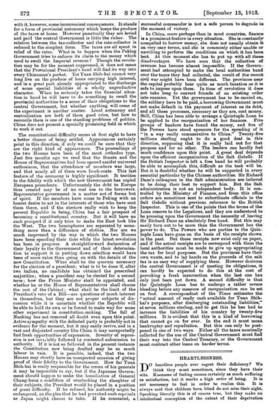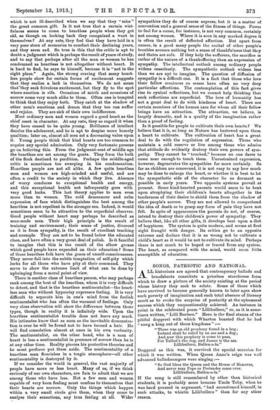HEARTLESSNESS.
DO heartless people ever regret their deficiency ? We think they must sometimes, since they have their wits. Keenness of feeling causes certainly as much suffering as satisfaction, but it marks a high order of being. It is
not necessary to feel in order to realize this. It is always said that children born blind do not miss their sight.. Speaking literally this is of course true, but they make an intellectual conception of the extent of their deprivation
which is not ill-described when we say that they " miss " the great common gift. Is it not true that a certain wist- fulness seems to come to heartless people when they get old, as though on looking back they recognized a want in themselves P At any rate, they feel that they have laid in a very poor store of memories to comfort their declining years, and they seem sad. So true is this that the critic is apt to doubt a judgment which is perhaps the result of years of study, and to say that perhaps after all the man or woman he has condemned as heartless is not altogether without heart. It is hard to find, he says to himself, because it is "not in the right place." Again, the strong craving that many heart- less people show for certain forms of excitement suggests that they realize a lack in themselves. We do not mean that-they seek frivolous excitement, but they fly to the spot where emotion is rife. Occasions of mirth and occasions of sorrow come very much alike to them. Often one is tempted to think that they enjoy both. They catch at the shadow of other men's emotions and dream that they too can suffer and rejoice. They are sick of their own indifference.
Most ordinary men and women regard a good heart as the chief asset in character. At any rate, they BO regard it when they have ceased to be quite young. Brilliance of intellect dazzles the adolescent, and he is apt to despise more homely qualities; later on, almost all men set a decreasing value upon it. Young people think that kind hearts are too common to require any special admiration. Only very fortunate persons go on believing this. From the judgment-seat of middle age the heartless are set among the goats. They form the bulk of the flock destined to perdition. Perhaps the middle-aged critic is sometimes too sweeping in his condemnation. Heartless people are not all alike. A few quite heartless men and women are high-minded and useful, and are often a credit to the society in which they live. Absence of worry conduces to exceptional health and energy, and this exceptional health not infrequently goes with very good looks. This last theory applies to men even more than to women. The cold demeanour and calm expression of face which distinguishes the best among the heartless is not repellent in the stronger sex. Indeed, it would sometimes seem to be attractive to the superficial observer. Good people without heart may perhaps be described as man-made men. Their high principle is the result of training and environment; their sense of justice, divorced as it is from sympathy, is the result of excellent teaching and example. They are not to be found below the educated class, and have often a very great deal of polish. Is it fanciful to imagine that this is the result of the elbow grease which good people have expended on their education ? Some of these heartless folk have the grace of unself-consciousness. They never fall into the subtle temptation of self-pity which lurks for all those who have pity at their command. They serve to show the extreme limit of what can be done by upbringing from a moral point of view.
There is another class of heartless person, who may perhaps rank among the best of the heartless, whom it is very difficult to detect, and that is the heartless sentimentalist—the heart- less man who without hypocrisy expresses feeling. It is very difficult to separate him in one's mind from the foolish sentimentalist who has often the warmest of feelings. Only very close observation will show the difference between those types, though in reality it is infinitely wide. Upon the heartless sentimentalist trouble does not leave any mark. His intimates know that as soon as the inevitable demonstra- tion is over he will be found not to have turned a hair. He will find consolation almost at once in his own verbosity. The sentimentalist, on the other hand, who is a man of heart is less a sentimentalist in presence of sorrow than he is at any other time. Reality pierces his protective theories and he must perforce put them aside. The sentimentality of a heartless man flourishes in a tragic atmosphere—all other sentimentality is destroyed by it.
If we consider the world in general, the vast majority of people have more or less heart. Many of us, if we think seriously of our own characters, are fain to admit that we are among those who have less. Not a few men and women capable of very keen feeling must confess to themselves that their hearts are narrow. Only the things which happen within a very small circle give them, when they come to analyse their sensations, any _ true feeling at all. Wider
sympathies they do of course express, but it is a matter of convention and a general sense of the fitness of things. Power to feel for a cause, for instance, is not very common, certainly not among women. Where it is seen in any marked degree it is often the result of deflected affection. But apart from causes, in a good many people the recital of other people's troubles arouses nothing but a sense of thankfulness that they and theirs are safe. If they help the sufferers, the sacrifice is rather of the nature of a thankoffering than an expression of sympathy. The intellectual outlook among ordinary people widens ceaselessly. The sympathetic outlook widens less than we are apt to imagine. The question of diffusion of sympathy is a difficult one. It is a fact that those who love their fellow creatures en. masse have often no very deep particular affections. The contemplation of this fact gives rise to cynical reflections, but we cannot help thinking that such reflections are superficial. The love of humanity has not a great deal to do with kindness of heart. There are certain members of the human race for whom all their fellow beings have an attraction. The attraction, we believe, is largely dramatic, and is a quality of the imagination rather than a proof of feeling.
Is it possible for people to cultivate their own hearts ? We believe that it is, so long as Nature has bestowed upon them a heart to cultivate. The cultivation of heart has a great deal to do with the regulation of expression. Those who maintain k cold reserve or live among those who admire that attitude do evidently destroy their own powers of sym- pathy. They cannot be "touched," because no one dares to come near enough to touch them. Unrestrained expression, however, degenerates the sympathies far more certainly. So far as children are concerned, it is not easy to say how much may be done to enlarge the heart, or whether it is best to let the sympathetic side of the character lie as dormant as possible in early years. Two opposite systems prevail at present. Some kind-hearted parents would seem to be bent upon atrophying their children's hearts altogether in the tenderness of their desire to shield them from the shadow of other people's sorrow. They are not allowed to comprehend the idea of death or to grasp any form of pain they have not felt. In spite of appearances the parents do not, of course, intend to destroy their children's power of sympathy. They believe that, like all other gifts, it develops best upon a diet of happiness. The system is quite modern, and seems at first sight fraught with danger. Its critics go to an opposite extreme and declare that it is as wrong not to cultivate a child's heart as it would be not to cultivate its mind. Perhaps there is not much to be hoped or feared from any system. The heart, as compared with the mind, would seem little susceptible of education.











































 Previous page
Previous page